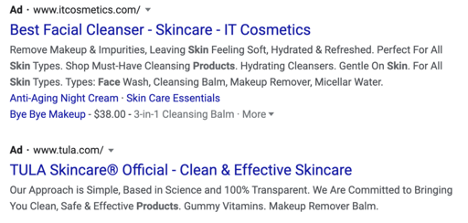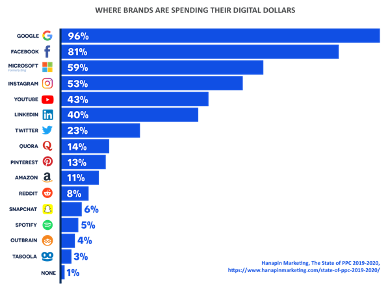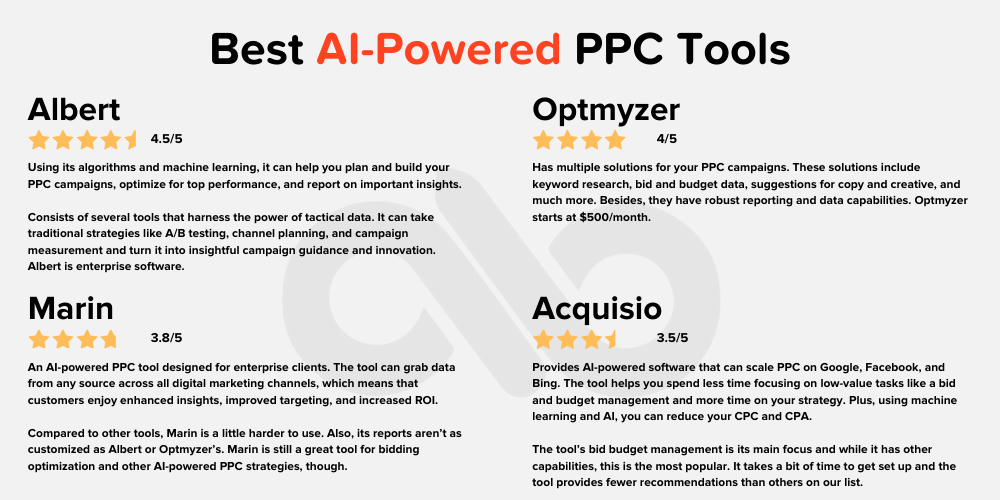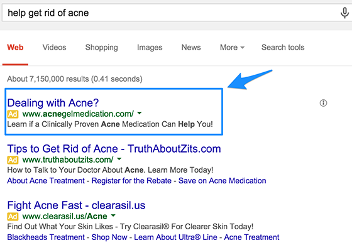Businesses competing in the digital era often leverage paid advertising to reach their target audiences on a large scale. When it comes to paid media, there are many terms to be familiar with, such as impressions, bids, etc. PPC is a term that businesses may be aware of, but may not fully comprehend the impact it has on their paid media performance and metrics. If you have ever noticed the advertisements alongside search results on Google, you are familiar with PPC.
Below we’ll explore PPC, including how it works, trends to watch for, and how your business can benefit from it.
What is PPC
Pay-per-click advertising is a form of digital marketing where advertisers pay every time a (text, video, image) ad is clicked. In other words, it’s not possible to “earn” those visits organically; it’s a business model for buying visitors. Most PPC ads are placed by Google, although you can also see them on Facebook, Bing, and other places. PPC is used to help reach campaign goals, including increasing sales, generating leads, and promoting brand awareness.
Note: It’s not uncommon for people to confuse the terms PPC and CPC. You can read more about the differences between the two in our blog: PPC vs. CPC.
Understanding PPC and How It Works
An important type of PPC advertising is search engine advertising. It allows advertisers to bid for ad placement in a search engine’s sponsored links when someone searches on a keyword related to their business offering.

There is an auction for the keyword on a SERP (search engine results page) immediately after an ad spot becomes available. Several factors, such as the bid amount and quality of the ad, determine who gets the top spot on the search results page. A PPC campaign cannot function without these auctions. The auction process is triggered when advertisers want to display ads related to a user’s search query. These search engine results pages would then display the ad that has the highest bid, and Google deems most relevant when a related search query is made.
Making Sense of the Past
While PPC has been around for several decades, it has undergone a number of major changes and milestones over time. The modifications made to paid search over the years have led to a greater level of adoption and helped make pay per click one of the most popular ways of advertising online today.
One major PPC trend we can’t ignore is the optimization of PPC for mobile devices. In 2020, 82 percent of smartphone users were actively searching for businesses near them on their phones. Many predicted that mobile would be the next big internet marketing trend, and they proved right.
Furthermore, PPC has always stayed current with the platforms our contacts are using. Remember when AOL was hot? Due to the constant change in the digital advertising industry, PPC advertising trends are constantly evolving to stay accessible no matter what device or platform we use today, such as Instagram or Tik Tok ads.
PPC opportunities continue to adapt as the market and industry change; so what can we expect our PPC trends to be in the following years?
PPC Trends & Best Practices
Diversification Will Become More Important
Promotion will soon require diversification more than just Google. Experiment with different programs including Youtube, Facebook, Instagram, and TikTok ads to see which PPC strategy is the best for your company and your audience preferences. Identifying the types of content that will appeal to your audience is essential to know where you should present your content. When determining which platform is best for your business, look at what your competitors are doing.
Success is more likely with greater variety. You gain agility through diversity so that you can adapt to new situations. By rearranging your plan as your needs change, you can take advantage of additional openings.

Voice Search For PPC Campaigns
Voice search is far more than asking Alexa or Siri what the weather is like. Many companies are using voice search to measure customer behavior. At least 50% of consumers will be using voice shopping by 2022. For example, customers can ask their voice device to make a purchase on your behalf, or find a local coffee shop.
PPC impacts voice search by running campaigns that are optimized specifically toward voice search. Voice search campaigns are conversational, mobile-friendly, and often ask questions such as “Since you purchased dish soap two months ago, are you looking to replace it?”.
To successfully run a PPC campaign, it is recommended that you target long-tail keywords. Voice search is no exception. Use long-tail keywords when running a PPC ad if you want your ad to appear in voice search results.
PPC Automation & Artificial Intelligence
There are many aspects of digital marketing that are becoming automated, which does not exempt pay-per-click. Ads are only as good as the data provided. If you are not targeting the right audience, then your ad will be ineffective. The data that comes through analytics automation channels will funnel instant feedback to better your PPC advertisements so you can continue optimizing your ads to reach the right people at the right time, with the right message.

Ads Data Hub
Google continues to dominate the PPC market and announces new advancements regularly. With the introduction of Ads Data Hub, you can tailor your marketing measurement approach to your business’s unique needs. Using the Ads Data Hub, marketers will have access to comprehensive reporting and measurement capabilities, which were not available with previous versions. This will affect PPC because companies can adjust their ads based on the data to best appeal to potential customers.

More Targeted Ad Message
Ads can sometimes send mixed messages when not targeted to the right audience. A well-thought-out PPC strategy is essential to getting quality leads. By using a more targeted ad message, you can give your prospective customers a better understanding of your business and the product you are selling. By utilizing audience targeting, topic targeting, demographic targeting, and interest targeting features, you can personalize your ads and ensure they are being displayed to the right audience.
Personalized ads target the best audience by tailoring the message and identifying their characteristics. Targeted ads relate to the potential customers and hopefully provide the answer to their questions.

Partner with Pyxl
Pyxl continues to work to develop strategies of incorporating new trends and automation into our companies wants and needs. If you are interested in creating a quality PPC campaign, consider Pyxl. Contact Pyxl today!
Updated: Dec 23, 2025
 Bonnie Winter
Bonnie Winter Kati Terzinski
Kati Terzinski Erin Murray
Erin Murray